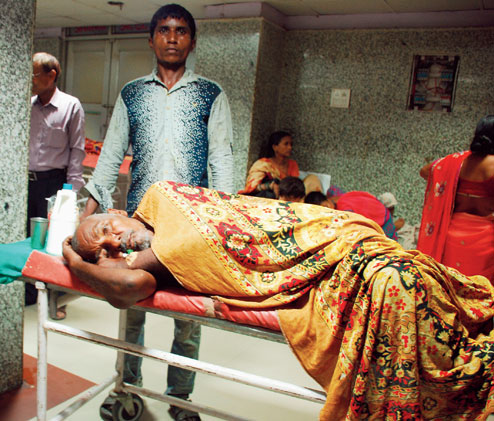
A hernia patient had to shuttle between the city's top government hospitals that refused to operate on him before health minister Tej Pratap's office stepped in.
Relatives brought Mohammad Tahir to Patna Medical College and Hospital (PMCH), about 240km from his village of Gwalpara south in Madhepura district, around 6am. The PMCH doctors said they were ill-equipped to operate on Tahir (65), and advised the relatives to take him to Delhi or Lucknow. Then, they said Tahir should be taken to Indira Gandhi Institute of Medical Sciences (IGIMS). IGIMS was sent him back to PMCH at 3pm with the same excuse.
Tahir's ordeal was because he was suffering from Hepatitis C, an infectious disease. The second time he was taken to PMCH - with assurances from health minister Tej Pratap's office - the doctors told Tahir's relatives that they could not operate on him. The hospital does not have a separate operating theatre for conducting surgeries on patients suffering from infectious diseases, they said.
A Patna surgeon, who did not wish to be identified, said there were chances of Tahir developing gangrene in the area affected by the hernia. "If the patient's affected parts are not removed through surgery at the earliest, he might suffer from septicemia (blood infection) and shock," said the doctor.
Dimple Devi, zila parishad councillor of Gwalpara south, who accompanied Tahir to Patna, told The Telegraph: "When IGIMS also refused to take up Tahir's case, we contacted health minister Tej Pratap. The minister directed his personal secretary to take up the matter with the PMCH authority and we went back. The story at PMCH was the same the second time round and we again contacted the health minister's personal secretary. The secretary then called up hospital superintendent Lakhendra Prasad and college principal S.N. Sinha and gave them a piece of his mind. Tahir was admitted to hospital around 5.15pm."
When The Telegraph contacted senior PMCH and IGIMS authorities, they were evasive.
"I was not in the city for seven days and just reached on Friday. So I don't know anything about this matter," said IGIMS director N.R. Biswas. "Please speak to the hospital's additional medical superintendent Manish Mandal."
Mandal asked for the patient's registration number, promising to look into it.
At PMCH, the superintendent admitted that he got a call from the health minister's personal secretary for admitting Tahir and operating on him at the earliest.
"We admitted Tahir on Friday and we will provide him all the necessary treatments," said Lakhendra.
When The Telegraph asked him why the hospital did not admit Tahir in the morning, he said: "The hospital staff often make excuses when they get such patients as they fear catching infections. What can I do? I can take action only if I get a written complaint."
Tahir's son Mohammad Anamul was disappointed with the hospitals trying to shirk their responsibilities.
"We had lost all hopes for my father's treatment at PMCH and IGIMS and started contacting the private hospitals," he said. "One of the private hospitals agreed to take the case but they were charging Rs 80,000 for the operation. They said there was a lot of risk involved in the surgery as he was suffering from Hepatitis C. Thankfully, because we approached the health minister's office, the PMCH authorities agreed to take up my father's case. Otherwise, we would have to take loans to admit him to the private hospital."
Tahir was finally put on saline support on Friday evening and PMCH doctors told his relatives that the operation will be conducted by Saturday.










